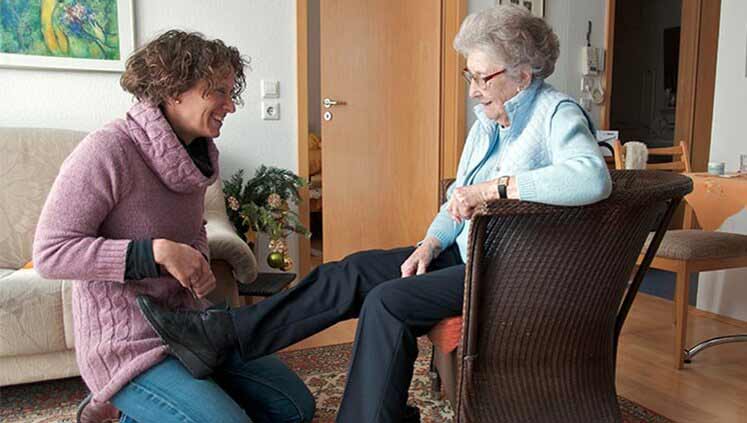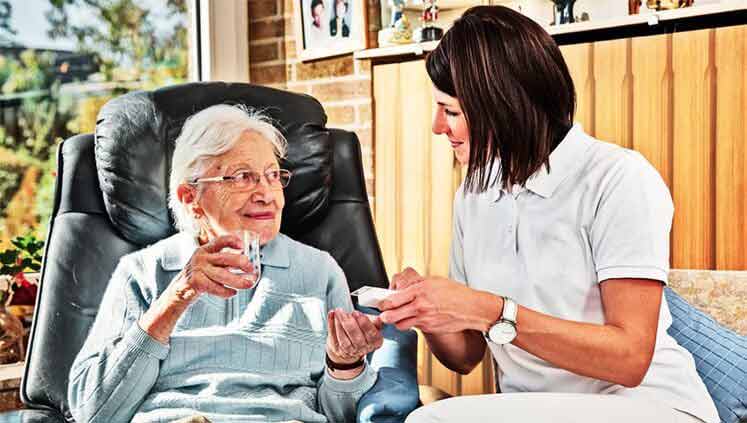Signs of Advancing Age Related Disabilities To Watch Out For:
Many times, the signs of aging are at first subtle. Many elderly people actively try to hide any infirmities or other difficulties they are experiencing. No one likes to admit they aren’t as physically able as they’d like to be.
- Sudden weight loss could be an indication the elderly person is simply not preparing or even eating food.
- Failure to take medication or over-dosing may indicate confusion, forgetfulness, or a misunderstanding of the doctor’s instructions.
- Burns or injury marks may indicate physical problems involving general weakness, forgetfulness, or a possible misuse of alcohol or prescription drugs.
- Deterioration of personal habits such as infrequent bathing and shampooing, not shaving, or not wearing dentures could be the result of either mental or physical problems.
- Increased car accidents can indicate slowed reflexes, poor vision, physical weakness, or a general inability to handle a vehicle.
- General forgetfulness such as not paying bills, missing appointments, or consistently forgetting names, addresses, phone numbers, and meal times.
- Extreme suspiciousness could indicate some physical disorders such as Alzheimer’s or Parkinson’s Disease. Intense ungrounded fears about dire consequences may likewise be a danger signal.
- A series of small fires could be caused by dozing off, forgetting to turn the stove or appliances off, or being careless with matches or cigarettes. They may also indicate blackouts or dizzy spells.
- Bizarre behavior of any kind could be a warning sign. This behavior could be dressing in heavy gloves and an overcoat in hot weather or going outside without shoes when it’s snowing. Uncharacteristic actions or speech patterns are also warning signs of mental decline.
- Disorientation of a consistent nature may indicate a need for help. Examples include not knowing who one is, where one is, who one’s family is, or talking to people who aren’t there. This is especially true for Alzheimer’s patients and those suffering from other forms of dementia.
Quality of Life
It’s no secret that as we grow older, usual and common place activities become increasingly more difficult. Sometimes just going to the store involves a major exertion.
- Impaired mobility is one of the senior population’s primary concerns. Half of all adults over 85, and one quarter of those over 75 experience noticeable mobility problems.
- Walking, climbing stairs, bathing, using the toilet, getting up from a chair or getting out of bed can pose considerable difficulties.
- Vision problems also become quite prevalent, especially when trying to read the all-too-often insanely small typeface on printed instructions and bills, or even the numbers on a credit card.
As the years progress, many elderly people can become completely disabled, totally dependent upon others for helping them do the smallest of tasks. How do you care for an elderly, disabled or sick parent, spouse or sibling and still have time for yourself as well?
to patients and families. Caregivers and support teams work closely
with patients, their families, and physicians to ensure:
Personalized Care in Various Aspects of Daily Living
-
Domestic Duties
- Meal Preparation
- Light Housekeeping
- Laundry & Linen Changes
- Shopping & Errands
- Driving to Appointments
-
Personal Care
- Bathing & Dressing
- Personal Grooming
- Bathroom Assistance
- Incontinent Care
-
Safety & Security
- Ambulating Assistance
- Wheelchair Transfers
- Medication Supervision
- Range of Motion Exercises
Affinity Brings Unrivaled Expertise in Senior Home Care
Enabling Your Loved Ones to Remain Independent and Happy in their Homes

Activities of Daily Living (ADL):
are fundamental and routine functions and activities that people tend to do every day without needing assistance.
- Eating: Assistance with feeding of daily meals and snacks
- Bathing: Washing and bathing assistance in a tub or shower
- Toileting: Assistance to and from the toilet, and associated personal hygiene
- Transferring: Assistance transferring to a bed, chair or wheelchair
- Continence Care: Care for aging people with bowel and urinary incontinence
- Dressing: Help with clothing, any necessary braces or artificial limbs

Instrumental Activities of Daily Living (IADL):
are activities that enable an individual to live
independently in a community.
- Errands and Shopping: Regular grocery and clothing shopping
- Medication Reminders: Making sure your loved one takes medications as prescribed
- Doctors Visits: Scheduling and arranging transportation to medical appointments
- Light Housekeeping: Ensuring your loved one is living in a clean and safe environment
- Meal Preparation: A caregiver can prepare a healthy and nutritious meal.
- Use of Communication Devices: Assisting with use of telephone or other form of communication.
To enable seniors, the homebound, and the chronically disabled to
live independently in the safety and security of their own homes for as long as possible,
we also provide Hospice Support, Custodial Care, Joyful Companionship, Respite for Family
Caregivers, and other In-Home services.